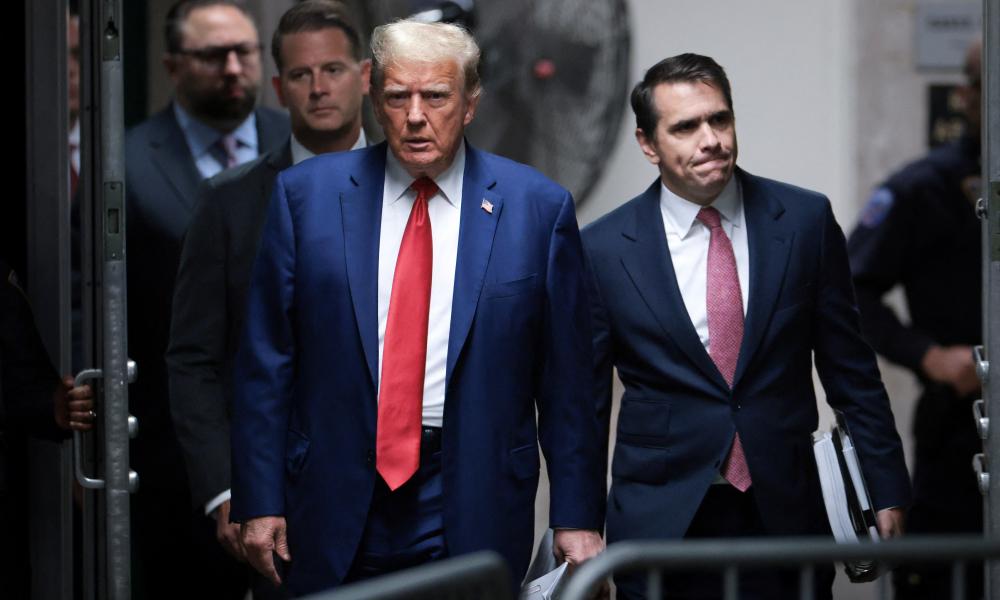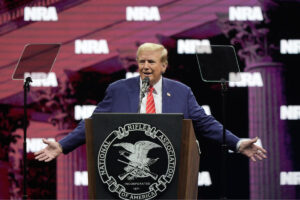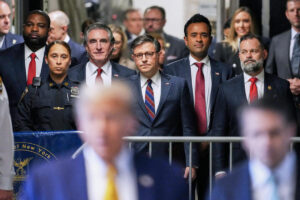The judge overseeing Donald Trump’s criminal hush-money trial on Monday held him in criminal contempt for the 10th time and warned he could face jail for continued violations of a gag order.
Juan Merchan’s admonition to Trump came in response to the Republican presidential frontrunner’s repeated commentary on trial witnesses and jurors, which flouts the judge’s order barring him from speaking about those who are testifying at the high-profile proceedings and panelists weighing his fate.
Merchan’s decision – which imposed a $1,000 fine – came less than one week after Trump was held in criminal contempt and fined $9,000 for violating the gag order on other occasions. The order was in response to Trump’s comments on the jury, which described their selection as rushed.
“Mr Trump, as you know the prosecution has filed three separate motions to find you in criminal contempt,” Merchan said. “It appears that the $1,000 fines are not a deterrent.”
Merchan continued: “The last thing I want to do is put you in jail. You are the former president of the United States and possibly the next president as well … but at the end of the day, I have a job to do and part of that job is to protect the dignity of the judicial system.”
He also said that Trump’s actions “constitute a direct attack on the rule of law. I cannot allow that to continue”.
“So as much as I do not want to impose a jail sanction,” Merchan added sternly, “I want you to understand that I will, if necessary and appropriate.”
The dramatic development unfolded moments after Trump entered Merchan’s courtroom for the 12th day of his criminal hush-money trial.
Trump, wearing a deep blue suit, said “good morning” to someone as he crossed into the well, and dropped a set of papers on to the defense table, which fell with a low, orderly whack.
The first witness called this week was Jeffrey McConney, former Trump Organization comptroller and senior vice-president. Through McConney’s testimony, the prosecution sought to show that Trump had intimate knowledge of his personal and companies’ finances – and that repayments to Cohen were out-of-the-ordinary for his boss.
“Who has the authority to approve invoices?” prosecutor Matthew Colangelo asked.
“President Trump, before he became president,” McConney said. When Trump was president, those authorized to greenlight invoices included the former chief financial officer Allen Weisselberg, as well as and Trump’s adult children.
Colangelo asked McConney about a talk he had with Weisselberg about repaying Cohen. Weisselberg, a longtime Trump loyalist, is presently jailed for perjury after lying in court in Trump’s civil fraud case.
“We have to reimburse Michael,” McConney recalled Weisselberg saying in an early 2017 meeting, where they determined Cohen was owed $420,000 for legal expenses and taxes, as well as a bonus. “He tossed the pad toward me, I started taking notes on what Allen said.”
Through questioning, Colangelo showed that Trump – who throughout the trial has been portrayed as incredibly cheap – lavished more money on Cohen than was normal. “Do these notes show that Mr Cohen was receiving $360,000 back on a $180,000 expense?” Colangelo asked.
“Yes,” McConney said.
“Are you aware of another incident where an expense was doubled because of taxes?” Colangelo pressed.
“No.”
Colangelo’s implication was clear: Cohen’s receipt of more money than he had paid out suggested that Trump was giving him special treatment, potentially to maintain his silence about the alleged hush-money cover-up.
Jurors were also shown Trump Organization ledger reports that described payments to Cohen coded as a “legal expense” and with “retainer” also listed. McConney had testified that he had not seen a retainer, again suggesting that Trump was falsifying business records – the charge he is facing.
On cross, defense attorney Emil Bove asked McConney whether Trump had told him to engage in any of the repayment practices that came up in Colangelo’s questioning.
McConney said, “He did not.”
The morning’s proceedings came after testimony from a teary top campaign aide, Hope Hicks, at the end of last week.
Hicks told jurors on Friday that Trump wielded complete control over his 2016 presidential campaign – including a media strategy which, prosecutors allege, involved illicit business records for hush-money payments.
Prosecutors must establish that Trump plotted with aides – then lawyer Michael Cohen and tabloid honcho David Pecker – to bury negative stories that could have thwarted his presidential bid, including accounts of extramarital affairs with the adult film actor Stormy Daniels and Playboy model Karen McDougal.
Cohen allegedly paid $130,000 to Daniels in exchange for her silence; prosecutors contend that Trump represented repayments to him as legal services, constituting felony falsification of business records.
By putting Trump at the center of his media strategy, Hicks’s testimony could bolster prosecutors’ argument that he was well aware of this catch-and-kill scheme, and the financial machinations used to allegedly cover up these payouts.



